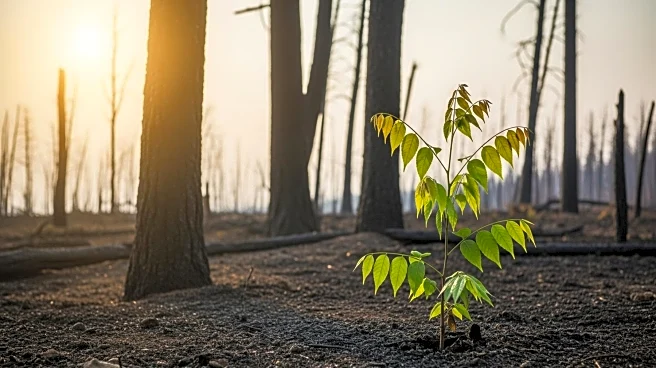What is the story about?
What's Happening?
Xcel Energy Inc. has agreed to pay approximately $640 million to settle claims related to the 2021 Colorado wildfire, which is considered the costliest in the state's history. The settlement was reached with individual property owners, public entities, and insurers, avoiding a trial that was set to begin in Boulder County. The company will recognize a $290 million charge to earnings as part of the settlement, although it does not admit fault or wrongdoing. The Marshall fire, which began near Boulder on December 30, 2021, destroyed over 1,000 homes and commercial structures, resulting in two fatalities. The fire was a combination of two separate ignitions, with the second being attributed to Xcel's power lines by investigators, although Xcel disputes this claim.
Why It's Important?
The settlement is significant as it highlights the growing financial and operational challenges faced by utilities in the wake of climate change-induced wildfires. Utilities are increasingly held accountable for damages caused by wildfires, leading to substantial financial liabilities. This case underscores the importance of infrastructure management and the potential risks utilities face in regions prone to wildfires. The settlement also reflects the broader impact of climate change on insurance companies, which are burdened with rising costs associated with rebuilding after such disasters. The resolution of this case may influence future litigation strategies and settlement negotiations for utilities facing similar claims.
What's Next?
With the settlement in place, Xcel Energy avoids a potentially costly trial that could have resulted in damages exceeding $7 billion. The company will focus on managing the financial impact of the settlement and maintaining its balance sheet strength. The resolution may prompt other utilities to consider settlements in similar cases to mitigate risks associated with prolonged litigation. Additionally, the settlement could lead to increased scrutiny and regulatory pressure on utilities to enhance infrastructure safety and fire prevention measures. Stakeholders, including insurance companies and public entities, may push for more stringent regulations to prevent future incidents.
Beyond the Headlines
The settlement raises questions about the ethical responsibilities of utilities in managing infrastructure and preventing wildfires. It also highlights the legal complexities involved in attributing blame for such disasters, especially when multiple factors contribute to ignition. The case may lead to long-term shifts in how utilities approach risk management and infrastructure investment, particularly in fire-prone areas. Furthermore, it underscores the need for collaborative efforts between utilities, regulators, and communities to address the challenges posed by climate change and ensure public safety.

















